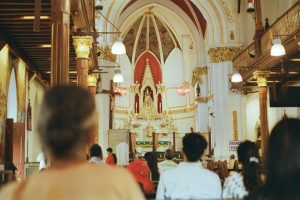Just weeks after the visitation of American women religious congregations was announced, the Leadership Conference of Women’s Religious (LCWR) learned that it would be the subject of a doctrinal assessment by the Vatican’s Congregation for the Doctrine of the Faith (CDF).
The 44-year-old LCWR has 1,500 members who represent about 95 percent of U.S. women religious. It is a resource to the leaders of congregations and it also provides a collective voice on issues of justice.
The CDF met with LCWR’s leaders nine years ago to inquire how they were receiving and promoting church teaching in three areas: ordination of women, interfaith relations, and homosexuality. According to the National Catholic Reporter, the CDF prefect, Cardinal William Levada, informed LCWR leaders of the need for the current assessment in a 2009 letter: “Given both the tenor and the doctrinal content of various addresses given at the annual assemblies of the Leadership Conference of Women Religious in the intervening years, this dicastery can only conclude that the problems which had motivated its request in 2001 continue to be present.”
Fifty-four percent of respondents to our survey consider the doctrinal assessment of LCWR to be “insulting and unjustified,” and 25 percent see it as unnecessary.
Even many of the 8 percent of respondents who believe it is “reasonable and justified” have concerns. One such sister-who writes from Ohio that she has “little use for the ideological blindness of LCWR”-says that the assessment “is being conducted in an insulting and dangerous manner that will not help matters. It ignores a lot of the good LCWR does, for example, mentoring new leadership in the hard decisions they need to make about giving up sponsorship, selling motherhouses, and reconfiguring provinces.”
While most respondents focused on LCWR’s role in cultivating leadership, others did not shy away from the charge of controversial perspectives: “Members of LCWR are chosen because we saw in them the ability, wisdom, and Spirit to lead our congregations,” writes Franciscan Sister Mariette Kalbac of Wheaton, Illinois. “We admire them for their courage in speaking their truth and taking stands that are sometimes prophetic and different from the institutional church.”
Regardless of where they stand on controversial issues, many respondents agree with Ursuline Sister Regina Rogers of Youngstown, Ohio: “As a former general superior, I appreciated their ability to envision a future for religious life. I also believe that they have gone out of their way to be open with the hierarchy. This openness has not been reciprocated.”
This article appeared in the January 2010 issue of U.S. Catholic (Vol. 75. No. 1, page 15).












Add comment